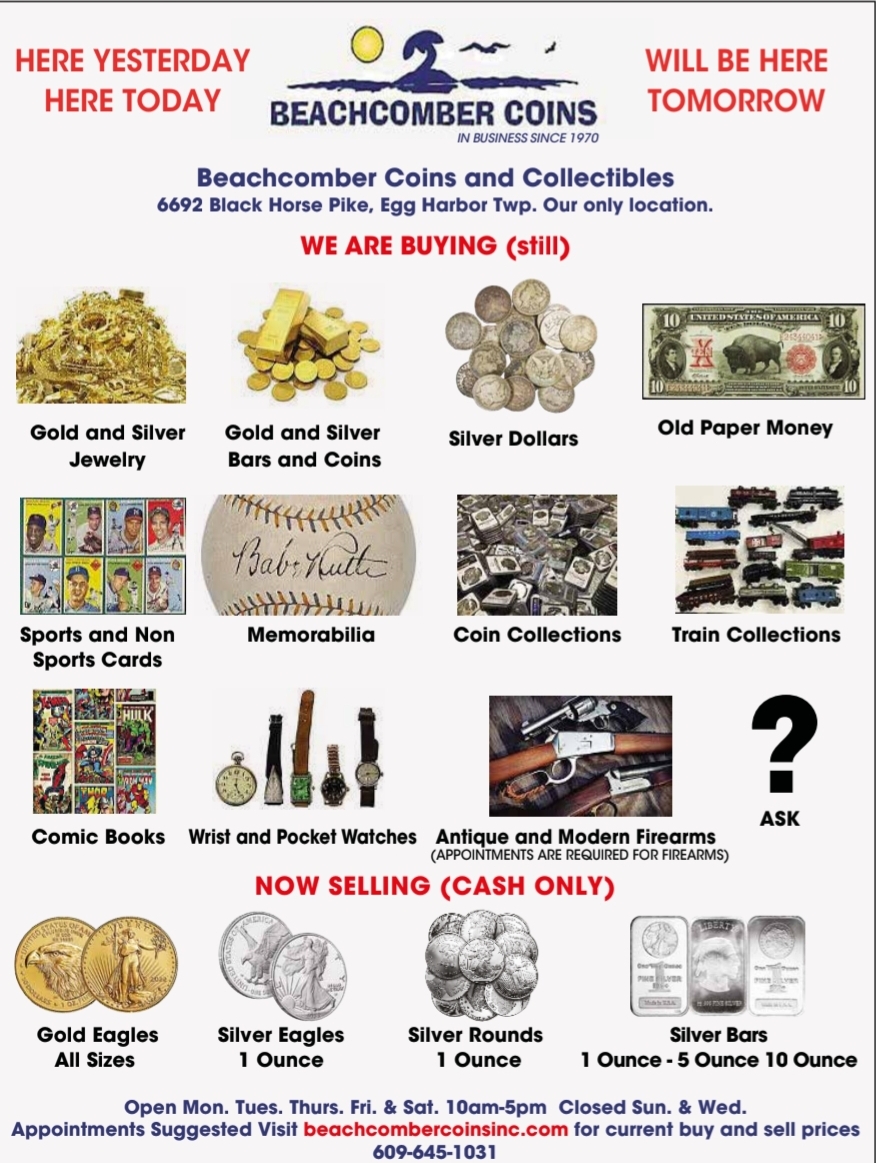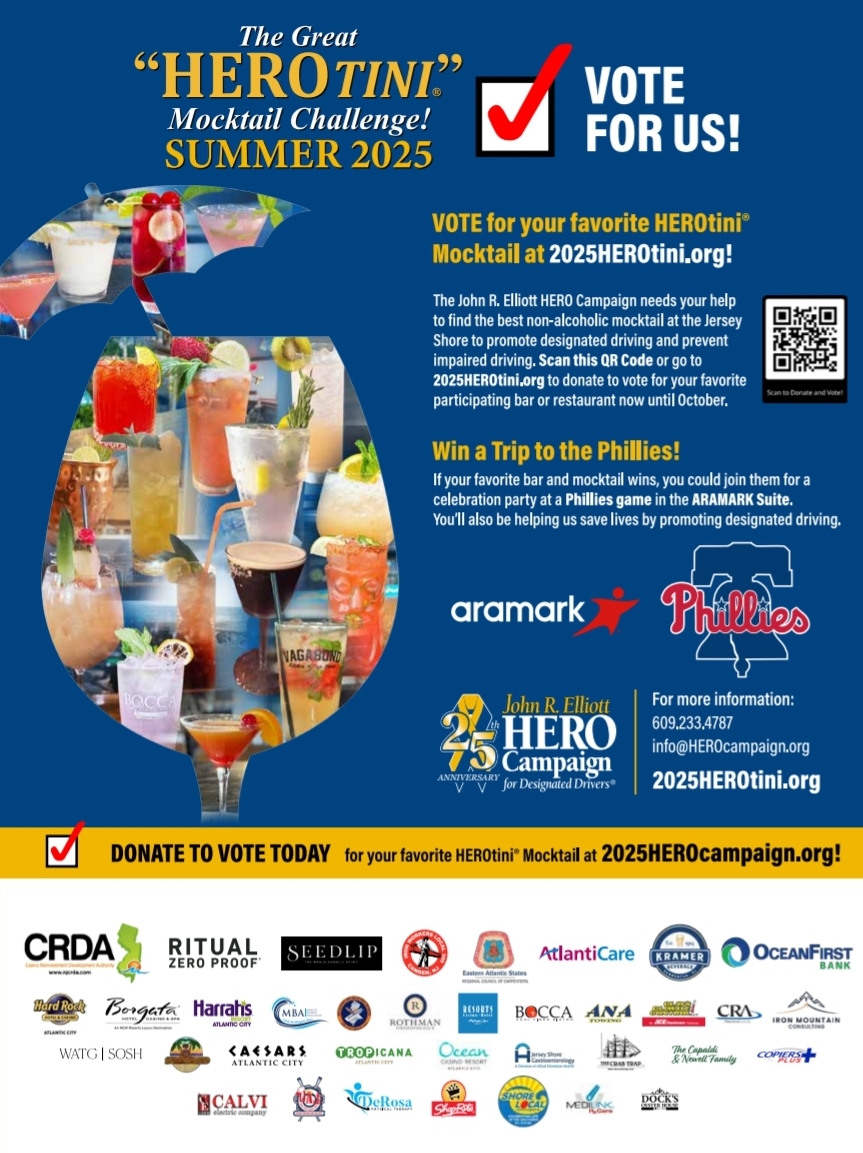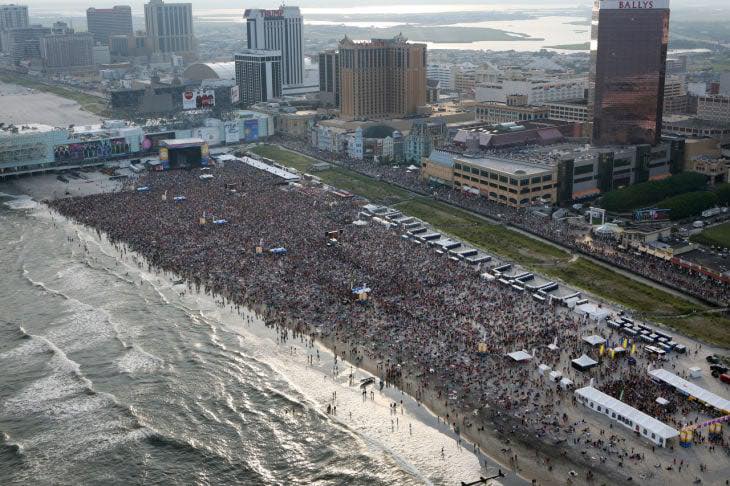Remembering When
The Beach Boys have been one of the most popular headline attractions of Atlantic City’s legal-gambling era. So much so that it would be difficult without a good deal of research to list every local appearance the legendary pop-rock unit has made during the past 47 years (they were likewise no strangers to Steel Pier in the pre-casino days, having performed there in July 1969). But next week will mark the 42nd anniversary of what was without question their highest-profile local gig ever, which took place on the beach on July 4, 1983.
Although the program stands as the largest, free entertainment event ever staged on the local strand—the New York Times reported that an estimated 200,000 people were there–it was not originally on Atlantic City’s July 4 “to-do” list that year.
The story begins not in Atlantic City in July, but in April, 1983 in Washington, D.C., where the group had been booked for a free, Independence Day concert set for the National Mall. But then fate, in the form of James Watt, then the nation’s Secretary of the Interior, intervened.
Watt, who died at 85 in 2023, was an ultra-conservative Pentecostal fundamentalist whose political and social views were extreme by any measure. For instance, he once declared all environmentalists to be “Nazis.” It was his department that had jurisdiction over the National Mall.
The Beach Boys had performed Independence Day shows at the landmark site in 1980 and 1981; Watt, citing what he described as “high drug use, high alcoholism, broken bottles, some injured people [and] some fights,” decided to cancel the concert. To drive home his point, he declared the Beach Boys (the Beach Boys, for goodness’ sake!) were not appropriate for the venue because they would draw the “wrong element” to the site (ultimately, that year’s D.C. celebration would showcase Wayne Newton and the U.S. Army Marching Blues Band).
“We’re trying to have an impact for wholesomeness,” Watt said, according to a 2023 article posted at theguardian.com. “July 4 will be a traditional ceremony for the family and for solid, clean American lives. We’re not going to encourage drug abuse and alcoholism as was done in the past years.
“The reason for the arrests and other trouble, we concluded, was that we had the rock bands attracting the wrong element, and you couldn’t bring your family, your children, down to the Mall for a Fourth of July picnic in the great traditional sense because you’d be mugged by…the wrong element, whatever is the nice way to say it.”
Watt’s move engendered vociferous responses, especially in the media. Among those in the anti-Watt camp was the New York Times, which compared Watt to Iranian Supreme Leader Ayatollah Khomeini because of the ban on Western popular culture Khomeini instituted when he took power in 1979.
According to the Guardian’s website, the Beach Boys’ official response to the cancellation included a reminder of a July 4 performance that had taken place five years earlier:
“The Soviet Union had enough confidence in the Beach Boys to invite them to perform in Leningrad [on] July 4, 1978,” read a statement released on their behalf. “Obviously, the Soviet Union, a much more controlled society than our own, did not feel the group attracted the wrong element.”
Watt’s boss, President Ronald Reagan—whom Watt later described, per the Times, as “a friend” of the band, called Watt on the carpet for his actions, and the message was received: He subsequently appeared before the press on the White House lawn holding, of all things, a plaster foot which had what was presumed to be a bullet hole in it (an apparent acknowledgment that he had figuratively shot himself in the foot).
“Obviously,” offered the clearly chastened cabinet member, “I didn’t know anything to start with. The president is a friend of the Beach Boys. He likes them, and I’m sure when I get to meet them, I’ll like them.” And thus, the decision to ban the Boys was rescinded. But the Beach Boys’ ship (the Sloop John B?) had already sailed from the nation’s capital.
Offers from other locales were quickly received by the group, which was determined to do a July 4 show somewhere on the East Coast. Among the suitors was what was then known as Caesars Boardwalk Regency Hotel & Casino (now Caesars Atlantic City), which partnered with Chevrolet on the winning bid.
According to archive.org, the group performed 24 songs that day, among them such signatures as “California Girls,” “God Only Knows,” “I Get Around,” “Help Me Rhonda” and “Good Vibrations” (audio is available at archive.org/details/beach-boys-live-on-atlantic-city-beach-caesars-1983-07-04).
Then-Mayor Michael Matthews declared the event a raging success, telling the media: “I think that Secretary Watt was wrong in his evaluation and the people proved that. [The audience] was orderly, they were a good audience, they were an enthusiastic audience.”
Indeed, it was a peaceful, wholesome day, with but two arrests–for public drunkenness and attempting to access the stage–reported.
However, the concert’s historical significance didn’t end with its backstory and the huge attendance: What no one—including the group’s members—could have known at the time was that the show would be the last one in which all five founding Beach Boys—Brian Wilson, who died earlier this month, his brother Dennis, who accidentally drowned in December, 1983, their brother Carl Wilson, Mike Love and Al Jardine—would perform together.
Chuck Darrow has spent more than 40 years writing about Atlantic City casinos.


















